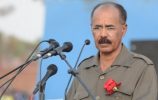The Eritrean government is set to end confrontation with its neighbor Ethiopia and end the longstanding ‘no peace, no war’ condition between the two nations. Eritrea is to send a delegation to Ethiopia, responding to the recent announcement of Ethiopian government to start implementing the UN mediated Algiers Agreement signed on December 12, 2000 ending the bloody war between the two nations.
This will be for the first time when the two government officials meet officially in close two decades. President Isaias Afwerki of Eritrea has announced yesterday that his country “will dispatch delegation to Addis Ababa for constructive engagement with Ethiopia.
“The events and developments that have unfolded in our region in general and in Ethiopia in particular in the recent period warrant appropriate attention. It is the Ethiopian people – forced as they were into adversarial ties of vertical polarization – who were primary victims, and who have borne the main brunt, of the destructive policies of the TPLF regime and its paymasters,” said President Isaias Afwerki of Eritrea, speaking yesterday on martyrs’ day.
“Ethiopia is now at a turning point or transition… Although it will require time and efforts to remove the TPLF’s toxic and malignant legacy and to bring about a congenial climate, the positive direction that has been set in motion is crystal clear,” President Isaias said.
“As it is the case with Eritrea, the people of Ethiopia also relish peace and harmony with their neighbour… The positive signals issued in these past days can be seen as an expression of this popular choice. The complementarity of both peoples & countries, their common bilateral interests & prosperity, are sacrosanct objectives to which we have toiled and paid sacrifices for two generations. As such, it remains a priority for which we will be actively engaged”
“The Eritrean & Ethiopian peoples have lost an opportunity of two generations for over half a century due to policies designed to promote external agendas. When they achieved their respective liberation in 1991 through common struggle, they embarked, in earnest, on new chapter. This (cooperation between Eritrea and Ethiopia) was prompted by the desire to advance their complimentary bilateral ties as well as to enhance collective growth in the entire Horn of Africa region,” President Isaias said, according to the twits by Yemane G.Meskel, the information Minister of Eritrea.
It was about a week ago that the Executive Committee of ruling coalition in Ethiopia, the Ethiopian Peoples’ Revolutionary Democratic Front (EPRDF), has announced its readiness to start implementation of the Algiers Agreement.
The objective of the decision is to end the no peace and no war condition, which the Prime Minister Abiy Ahmed of Ethiopia described it as, ‘deathless war’, according to the n executive committee.
Took place from 1998 till the end of 2000, the war between the two neighboring countries has resulted in the death of over 75, 000 people from both sides.
From 1961 until 1991, Eritrea had fought a long war of independence against Ethiopia. The Ethiopian Civil War began on 12 September 1974 when the Marxist Derg staged a coup d’état against Emperor Haile Selassie.
The civil war lasted until 1991 when the Ethiopian People’s Revolutionary Democratic Front (EPRDF)—a coalition of rebel groups led by the Tigrayan People’s Liberation Front (TPLF)—overthrew the Derg government and installed a transitional government in the Ethiopian capital Addis Ababa.

